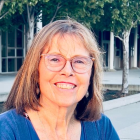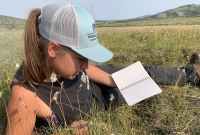Support strong Canadian climate journalism for 2025
As part of a series highlighting the work of young people in addressing the climate crisis, writer Patricia Lane interviews Dr. Samantha Green, an advocate for the Canadian Association of Physicians for the Environment.
Dr. Samantha Green
Dr. Samantha Green is a family physician and a mother of two young children. She sees her work as a board member and advocate with CAPE (Canadian Association of Physicians for the Environment) in the call for bold action on climate change as essential in both those roles.

Tell us about CAPE.
We are a network of doctors and other health-care providers who understand the health of our patients and families depends on a healthy planet. The changes we need won’t happen just because we want them, or even because they are science-based. We must build political will.
How does CAPE operate?
Our regional committees identify issues important to them, and our staff and board work at a national level. We listen to the science experts and our patients, and add our own area of expertise — human health. We partner with other groups to build momentum.
Have you had success?
CAPE has a long history of effectively collaborating with other health and environmental groups. Recently, we helped persuade the federal government to conduct an environmental assessment review of Premier Doug Ford’s proposed new superhighway 413. Environmental groups pointed out it will be catastrophic for forests, migratory birds and wetlands, and encourage emission-increasing car use. We noted the impacts on human health. Building a highway represents a choice not to prioritize communities designed for active transportation, public transit, and access to green space, which are much better for our health. Physicians prescribe time in nature to improve mental and physical health. Almost 10,000 Canadians a year die from fine particulate air pollution, and this will increase if we build more superhighways. I have treated patients for asthma exacerbated by air pollution from highways close to where they live. People who commute by car have increased rates of obesity, heart disease and depression and are less physically active. We need to build more walkable, medium-density neighbourhoods and stop favouring the private car.
You are the mother of eight-month-old Florence and three-year-old Jack, and you have a busy family practice. How and why do you find time for this?
It's part of both my jobs! The climate emergency is a health emergency. If we fail to meet our Paris targets, many more people will die in heat waves and extreme weather. Forest fires, which create lasting trauma from displacement, destroy homes and ecosystems, and produce toxic smoke, will get worse. Sea level rise, air pollution, deforestation — these are all human health hazards. Climate breakdown imperils food security in Canada, and all over the world, it is bringing untold misery to tens of millions of climate refugees. The oath all doctors take is to do no harm. Standing back is to contribute to the destruction of a livable planet. I am sworn not to do that.
I sometimes feel frustrated that the health of my patients is overwhelmingly attributable to factors like housing, income, and race — rather than anything that I can help with as a doctor. Climate breakdown disproportionately hurts Indigenous people, people living in poverty, and other marginalized groups who have no choice but to live near superhighways or have fewer resources to cope with heat waves and forest fires. Instead of making their lives worse, we need to design to make it better.

How did your childhood influence you?
My parents worked with people experiencing disabilities and taught my sister and I that everyone matters. We learned to be curious, to be aware of our own privilege and to share the joy of nature during the summers we spent in cottage country. When I was 10, I read a book about the meat industry. I told my parents I wanted to become a vegetarian and my mom cooked me special meals and my dad joined me.
What gives you hope?
Just last month, another mother in my neighbourhood asked if anyone would like to read the book All We Can Save with her. I didn’t know her really, but now a group of us are reading it together. Mothers collaborating gives me hope.
Action alleviates anxiety. It's as if I am prescribing involvement for my own mental health. I want to be able to say to my children that I tried my best. Our society must change. I get to participate in this transformation towards a more equitable, just and creative world.
What advice do you have for young people?
It is important to imagine the future we want. That imagination can morph into hope. My sister says, “Hope is a verb.” It is an action we can take.
And to older people?
There is so much for us all to do. If you work in health care, getting active means better advocacy for our patients. We can all unite around that.






Comments